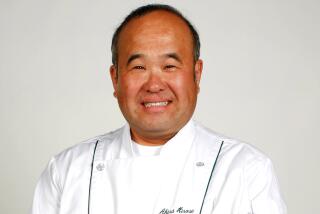Renowned Teacher and Restaurateur : French Cook Is Enjoying Success in Her ‘American Phase’
Madeleine Kamman, the feisty French woman who is renowned for her achievements as a cooking teacher and restaurateur, seems to be shifting gears.
“I am going into my American phase,” said Kamman, who returned to the United States in 1983 after four years of teaching in France. Kamman had given up a cooking school and affiliated restaurant in Boston in order to settle in Annecy, France. A negative experience in Boston encouraged her to make that move.
Bostonians, she said, did not appreciate her vision in opening the first nouvelle cuisine restaurant in that city. They also did not admire women in the restaurant field. “They are not progressive,” she said. “It was a tremendous shock in Boston for a woman to speak freely. I became very controversial.”
The French tax structure turned out to be worse than Bostonian conservatism. Kamman, who says she must have a restaurant in order to express her ideas, saw her money go into taxes, not her goal. So she came back, this time taking up residence in Glen, N.H., where she has opened a restaurant, L’Auberge Madeleine, “in the middle of the woods.”
Almost Got Her
California almost got her. “Personally, I would have settled in San Francisco if I were alone in the world,” said Kamman, who is married to an American and has two grown sons. “It’s cultural enough. It’s international, open to the whole world.”
Claiming to be over her rage toward France, Kamman praises her native land’s attitude toward food. The French “really understand food. They don’t fuss about it,” she said. “We (meaning Americans) are still in the fussing stage. Everybody is too complicated.”
Kamman predicts a change toward greater balance in American cooking in the next five years. “The great books on real modern American food have not yet been written,” she said.
That may be a sly way of saying that Kamman has another book up her sleeve. She also has a relatively new one on bookstore shelves. “In Madeleine’s Kitchen” (Atheneum: $22.95) is her fourth, the successor to “When French Women Cook,” “Dinner Against the Clock” and “The Making of a Cook.”
The recipes are preponderantly French, but the book praises some American ingredients, and Kamman prepared what she called “an American dinner” during a cooking demonstration while in Los Angeles on a promotional tour.
The courses were lobster salad with wild rice, pickling cucumbers and a dressing that included cilantro; chicken breasts with a sauce of prune puree, Dijon mustard and lapsang souchong tea, and a Bavarian cream topped with cranberry puree.
Loyal to Her Sex
Kamman is loyal to her sex. In the introduction to her book, she praises “the enormously rich font of cuisine provided by all the women in the world.” In person, she praises American home cooking. “I haven’t had a bad meal in an American home yet,” she said. She goes so far as to say that home cooking in the United States is surpassing restaurant food, intending this praise as a compliment to women. “Women have always had a better understanding of food than men. Women make better cooks than men,” she said.
Kamman was speaking of cooks, not chefs. But she singles out a woman, Cindy Black of Shepherd’s Restaurant in the Sheraton Harbor Island-East, San Diego, as “the top chef in the country, although nobody knows it.” Kamman describes Black’s work as “total brilliance.”
Black once studied with Kamman. In Kamman’s view, a good student is one “who absorbs the techniques rapidly and willingly, who quickly becomes independent, who is not a prima donna. When I have a real good student, they give me a hard time. They know where they are going. I love the resistance,” she said.
Two Weeks in France
Kamman takes eight students at a time. They study with her for six months, which includes two weeks in France. The daily program consists of 3 1/2 hours of lecture in the morning followed by 4 1/2 to five hours of cooking. In the summer, the students work at minimum wage as her restaurant staff, a practice to be followed at L’Auberge Madeleine. They plan, prepare and serve lunch and dinner, “with my solid hand behind it because, of course, I don’t want to go bankrupt,” she said. From January through May, the restaurant is open only on Saturday night, with Kamman preparing the menus. From July through October, it operates in full swing, then closes during November and December. In her book, Kamman writes of the decline of great restaurant cuisine in France, the United States and other countries. “It is an economic situation,” she said. Asked to comment on America’s ambitious young chefs, she complains of overdeveloped egos. “They are too young, too successful too fast. There is not enough work being done.” Immature chefs tend to be too complicated in their approach, she continued. They don’t have “quite the sense of what goes together.” Describing a restaurant meal where too many diverse elements were joined on the plate, she said, “America is suffering from this, from too much enthusiasm. They go too fast.”
On the positive side, she said, “American people don’t play too much with ingredients. There is a tremendous effort at all levels of society to do (sic) real good food.”
More to Read
Eat your way across L.A.
Get our weekly Tasting Notes newsletter for reviews, news and more.
You may occasionally receive promotional content from the Los Angeles Times.








